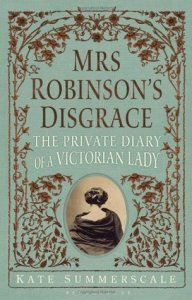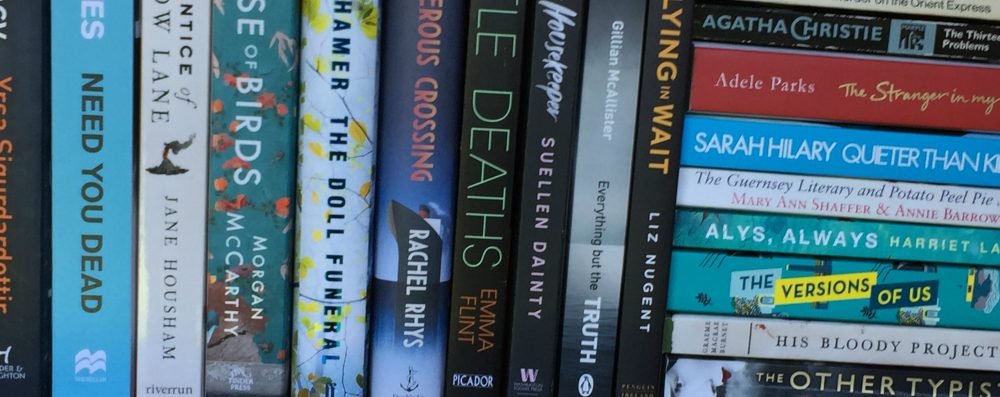
4*s
I have to admit that I enjoy a good Victorian scandal, one that ended up in court, made headline news and left reputation tattered and torn, so I settled down to enjoy. What I didn’t bank on was my growing sympathy for poor Isabella’s plight.
The author reveals the background to the story first and we know that Isabella Robinson, a widow with a young son, married Henry Robinson in 1844. A fiercely intelligent and well-read woman it didn’t take her long to realise that perhaps she should have held out for a better match:
He was an ‘uncongenial man’ she wrote in her diary: uneducated, narrow-minded, harsh-tempered, selfish, proud.’ While she yearned to talk about literature and politics, to write poetry, learn languages and read the latest essays on science and philosophy, he was ‘a man who had only a commercial life’
We hear how the couple moved around but the real action starts once they moved to Edinburgh, where with young children in tow they made the acquaintance of Elizabeth Drysdale, a fantastic host who shared her splendid home with her daughter Mary and her son-in-law Edward Lane. Edward Lane had studied to be a lawyer but was now training to be a doctor (these upper middle class men seemed to be eternally switching careers!) With Henry often away on business which was to design and build ships and mills for sugar cane it is clear that Isabella craved company, what she soon commits in writing is that she particularly craved a particular type of company from Mr Edward Lane.
I’m not going to lie, although by the end I had a lot of sympathy for Isabella, she led a life at that time which many could only have wondered at; she enjoyed her children’s company, was forever being entertained, going on holiday and able to read and contemplate her navel and commit those thoughts to her diary, whilst being waited upon hand and foot. But, and here is where things get far more complex, she had nothing to call her own. Indeed her fateful marriage to Henry had been partly bought about that she wasn’t an attractive prospect, a widow with a child, especially as her deceased husband had settled most of his money on the offspring from his first wife. Henry was no saint, he had offspring by an unmarried woman and was clearly after the money Isabella was given by her family, an amount settled yearly to avoid the fact that otherwise she had nothing under the law of the land at that time. Isabella was one of the many unlucky women who had no outlet for her intelligence, although I have to say at times her ‘poor me’ attitude grated. But she was stuck, divorce was practically impossible until the summer of 1858. In the end it was Henry that applied to divorce Isabella using the evidence from he own diary as proof.
This book is teaming with social history particularly that of the richer members of society at this time, and it is this that really made this book so fascinating for me and kept me reading, especially at the beginning when at times I tired at times of Isabella, although all that changed when we got to court! During the unfolding of the story as told in main, through the words of Isabella, although I was surprised to hear that the original diary no longer exists, there are snapshots of contemporary Victorian life infused with the story of Isabella’s disgrace at her own hand. A woman who is judged not only in the court room but by her peers across the land as snippets of her diary make their way into the newspapers.
I love the style of writing, there is no emphasising certain facts in this books just a clear and neutral retelling of a woman’s life, her choices and the consequences. The additional historical details all of which are impeccably researched include atheism, phrenology, water treatments, insanity and of course divorce law which make this one of the most educational books of the Victorian period and far more readily digested than dry facts.
There is no-one who quite manages to keep their voice so neutral and yet deliver such a well-researched and compelling story as Kate Summerscale and although I didn’t enjoy this book quite as much as the Suspicions of Mr Whicher this was a personal choice of subject rather than delivery. I am however delighted to hear from dear Fiction Fan that Kate Summerscale has a new Victorian crime to delight us with in May; The Wicked Boy: The Mystery of a Victorian Child Murderer is on pre-order!

I very nearly read this book when it came out a few years ago, but then it dropped off my radar for some reason (as these things do). It sounds like an engrossing read. Lovely review!
LikeLike
Thank you Jacqui, I obviously bought my copy soon after it was published and then at some point forgot all about it.. another excellent purchase I’m pleased to say.
LikeLike
I really couldn’t get on with Mr Whicher but I might give this a go. It sounds really interesting.
LikeLike
Mr Whicher was a huge hit with me but then I love the criminal aspect – this is fascinating particularly when looking at the social changes in women’s lives!
LikeLiked by 1 person
I’m sure I have this buried away on my kindle. It does sound fascinating.
LikeLike
It is and on such a wide-reaching number of subjects – my copy was buried on my kindle too!
LikeLiked by 1 person
Fine review, Cleo, for which thanks. And the story sounds really interesting, too, in terms of the social history that it features. Seeing what life was like during that era is much more meaningful if you can see it through the eyes of people lived through it. Fascinating!
LikeLike
You are absolutely right Margot, the views Mrs Robinson, and those around her held were enlightening because that was what ‘real’ people’s concerns were at that time – fascinating stuff indeed.
LikeLiked by 1 person
Sounds great! Did she write The Suspicions of Mr Whicher? I loved it.
LikeLike
She did indeed, so excited that she has a new one coming out this year too!
LikeLiked by 1 person
I adore a writer who makes you feel sympathy towards characters you never thought possible as well as have a lot of social information tied in. Happy you liked this one 🙂
LikeLike
I too like non fiction and I’ve had my eye on this. I didn’t read The Suspicions of Mr W but I know someone who did so I heard a lot about the book second hand.
LikeLike
The Suspicions of Mr Whicher is one of my favourite books of all time – it has history and crime and the author did a fantastic job of presenting the facts in a readable way – those same writing qualities are present in this book too!
LikeLike
Just took a look at the new upcoming title and it looks very good indeed.
I heard so much about the details of the Suspicions of Mr W. (almost a blow by blow) I feel as though I read the book.
LikeLike
Haha, we all know people like that! – I’m extremely excited about the new one, so much so it’s already on order and I rarely do that!
LikeLike
I must admit that I was drawn in by the character’s name: Mrs. Robinson. I recall the Mrs. Robinson in The Graduate (definitely not a Victorian story!); and I, too, was named Mrs. Robinson for a while…during the 60s. I escaped. But that is another story.
Thanks for sharing, and I am definitely tempted!
LikeLike
One of the loveliest things about blogging is to see how other people are drawn to titles in random ways too – I remember watching most of the Graduate as a teenager babysitting and being desperately upset when the mother came home and I had to leave! It is a great look at a period of history when society began to shift… albeit only slightly
LikeLike
I loved The Suspicions of Mr Whicher and may try this now, having read your post. It’s great how this author uses a specific episode to illuminate a whole period of history and its social mores.
LikeLike
I felt very much the same as you about this one – I enjoyed it, but not as much as Mr Whicher, which I loved. I couldn’t get up an awful lot of sympathy for Mrs Robinson, and after reading her diary entries I could kinda sympathise with the doctors who thought she was nuts! 😉 But it was interesting nonetheless and I think the new one sounds as if it should be great! Thanks for the kind mention! 🙂
LikeLike
Ooh I’m so excited to hear about the new one! I really enjoyed this but have yet to get to The Suspicions of Mr W. It is on the bookshelf though, promise. 🙂
LikeLike